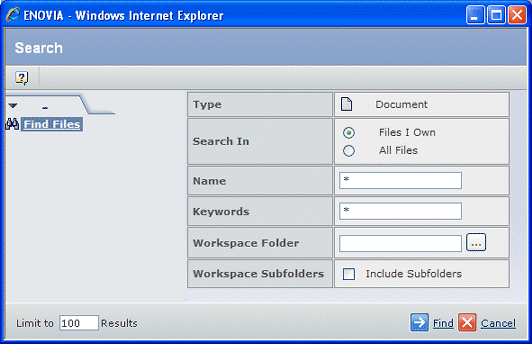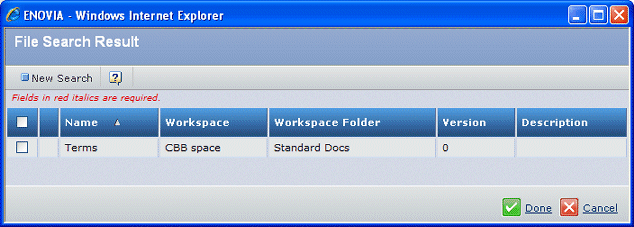Enter Search Criteria: Files
You can define criteria to find the files you need.
From the page Actions menu or toolbar, click Add Files from Workspace.

Enter criteria for any of these fields:
Search In. Choose to look within these sets of files: - Files I Own. Search for files assigned to you only.
- All Files. Search for all files you have access to.
Keywords. To search based on the words or part of a word appearing in the document content, enter the text to search for using the following guidelines. If you don't want to search based on the file content, leave the box empty. For more search options, see Searching for Files.
- Enter a word to search for documents that contain that word. The search will only find documents with the exact words and will not find variations. For example, if you enter "schedule", the search will not find documents containing "schedules". To search for variations on words, use the wildcard *.
- Enter your search terms in lower case. The search engine will find documents that contain both upper and lower case instances of your search term.
- Search for phrases by entering the words separated by spaces.
- Expand your searches by linking your search terms with OR. The search engine will find documents that contain at least one of your search terms.
- Narrow your searches by linking your search terms with AND. The search engine will find pages that contain all of your search terms.
Workspace Folder. Click  to narrow the search to quotations in a specific workspace folder; see Selecting from Lists. to narrow the search to quotations in a specific workspace folder; see Selecting from Lists. Workspace SubFolders. To include documents added to subfolders within the specified folder, check Include Subfolders.
Use the Limit to text box to specify how many items should be shown in the search results. For example, if you limit the results to 50, the system will get only the first 50 items from the database that match your criteria. The maximum is by default 1000, but may vary depending on your installation setup.
Check Paginate results to show the results with a limited number of items per page, based on your defined pagination preference.
If you want, use the page toolbar buttons to save the search criteria. See Saving Searches.
If needed, use the Search Types menu to select a different type of search. The searches in this menu are the same as those accessed from the global Search menu.
Click Search.

Use Search Results: Files
The results page shows the files that match your search criteria.
In the search dialog box, enter criteria and click Search.

The search results contain these columns:
Name. The name of the file. Workspace. The name of the workspace that contains the folder that contains the file. Workspace Folder. The name of the folder that contains the file. Version. The version level of the file. Description. Description of the file.
To change the search criteria, click New Search.
If adding files to a page, check the needed files and click Done.

Keyword Search Options
You can enter keywords using the syntax described here when searching for files.
-
Use any of these methods to enter keyword searches.
| Search Term |
Finds Documents that contain |
|---|
| schedule |
The word "schedule", "Schedule", and "SCHEDULE", but not variations of the word, such as "schedules". |
| Schedule |
The word "Schedule" with the initial letter in upper case. |
| "S&L" |
The words "S&L", "S & L", and "S L". Always enclose words with special characters, like "&", in quotation marks. The search engine expands the search to include variations of the specified string. |
| <CASE>LAW |
The word "LAW" in upper case. |
| <TYPO>receive |
Either the word "receive" or the word "receive". |
| <TYPO>behavior |
Either the US spelling "behavior" or the UK spelling "behaviour". |
| board meeting |
The phrase "board meeting". |
| Web* |
Words that begin with "Web". |
| fl??ss |
Words beginning with "fl" and ending with "ss" with any two characters in between. |
| schedule AND project |
*Both words. |
| schedule OR project |
*At least one of the words. |
| schedule, project |
At least one of the words. The comma is the same as OR. |
| schedule NOT holiday |
*The word "schedule" but not the word "holiday". |
| schedule <NEAR> review |
The word "schedule" close to the word "review". |
| schedule <SENTENCE> review |
The words "schedule" and "review" in the same sentence. |
| schedule <PARAGRAPH> review |
The word "schedule" and "review" in the same paragraph. |
c:\\schedules O\'Brian |
"c:\schedules" "O'Brian" The following punctuation marks are special operators. To let the system know you want to include a mark in the search, type the backslash before the mark. , ( ) [ = > < ! ‘ @ ` < { [ ! |
*To include AND, OR, or NOT as a search term, surround the term in quotes. For example, the following search term finds documents with the entire phrase "smoke and mirrors": smoke "and" mirrors
|
![]()

